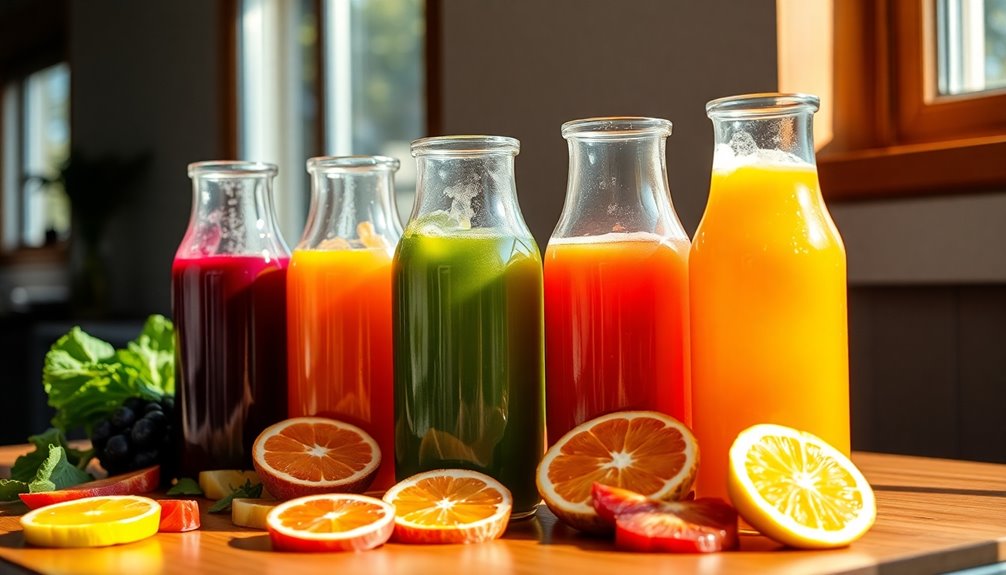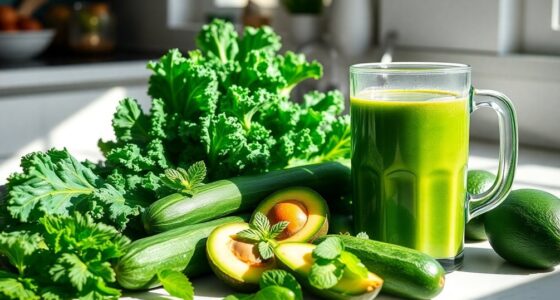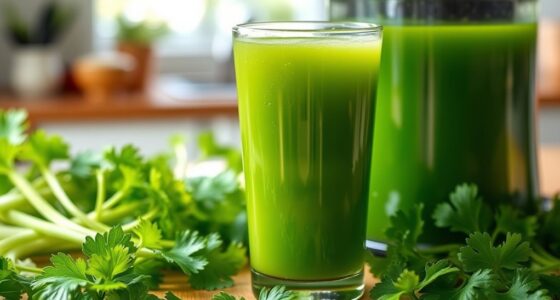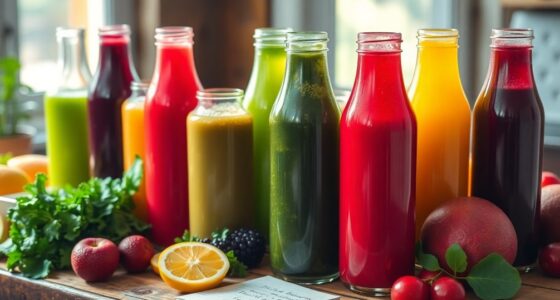Juice cleansing can give you a boost of essential vitamins and antioxidants, enhancing your immune system and overall health. While it may create a temporary calorie deficit, leading to quick weight loss, it's essential to consider its limitations. Juice cleanses can also improve gut health by promoting digestion. However, you need to watch out for potential risks like nutrient deficiencies. Stick around, and you'll uncover what you really need for sustainable nutrition and weight management.
Key Takeaways
- Juice cleansing provides a quick nutrient boost, rich in vitamins and antioxidants, supporting overall health and immune function.
- It can enhance gut health by supplying prebiotics and probiotics, promoting better digestion and regular bowel movements.
- Hydration is improved through fresh juices, which help maintain proper organ function and overall well-being.
- Juice cleanses may lead to temporary weight loss by creating a calorie deficit, although it's often water weight and not sustainable.
- Anti-inflammatory ingredients in juices can help reduce bloating and allow the digestive system to rest, improving digestive health.
Nutritional Powerhouse: Vitamins and Antioxidants in Juices
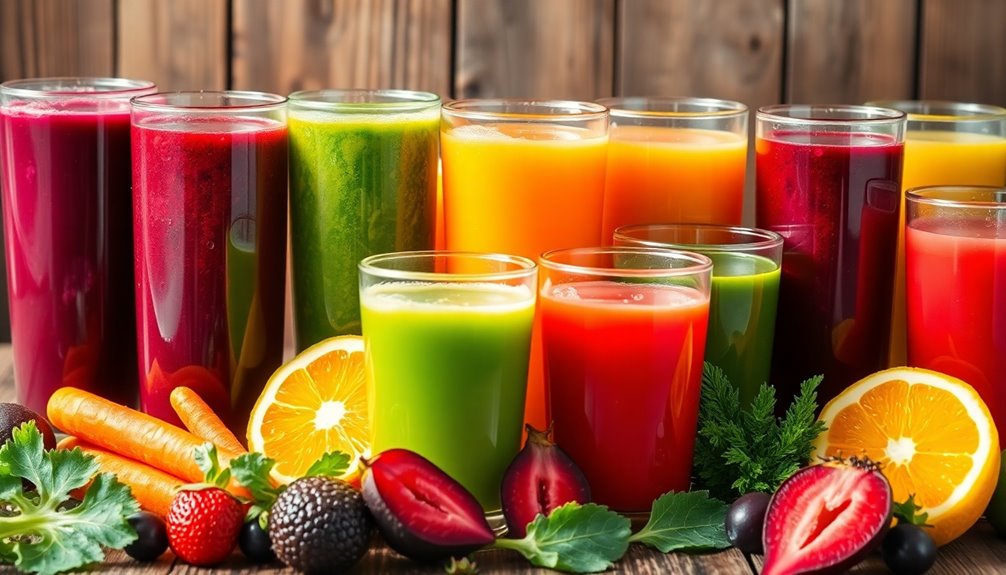
When you incorporate juices into your diet, you're tapping into a nutritional powerhouse packed with essential vitamins and antioxidants. Juices like orange and lemon are rich in vitamin C, boosting your immune system and fighting free radicals. Carrot juice provides vitamin A, supporting your vision and immune function, while leafy greens deliver vitamin K for bone health. Beets are a folate-rich option, crucial for cell growth. The antioxidants in these juices, such as polyphenols and anthocyanins, help reduce inflammation and oxidative stress. With rapid nutrient absorption, juices not only enhance cardiovascular health but also support skin repair and detoxification, making them a great way to access numerous vitamins and minerals. Additionally, green juices are particularly beneficial due to their high content of chlorophyll, which may improve blood health and oxygen levels.
Temporary Weight Loss: The Appeal of Juice Cleansing
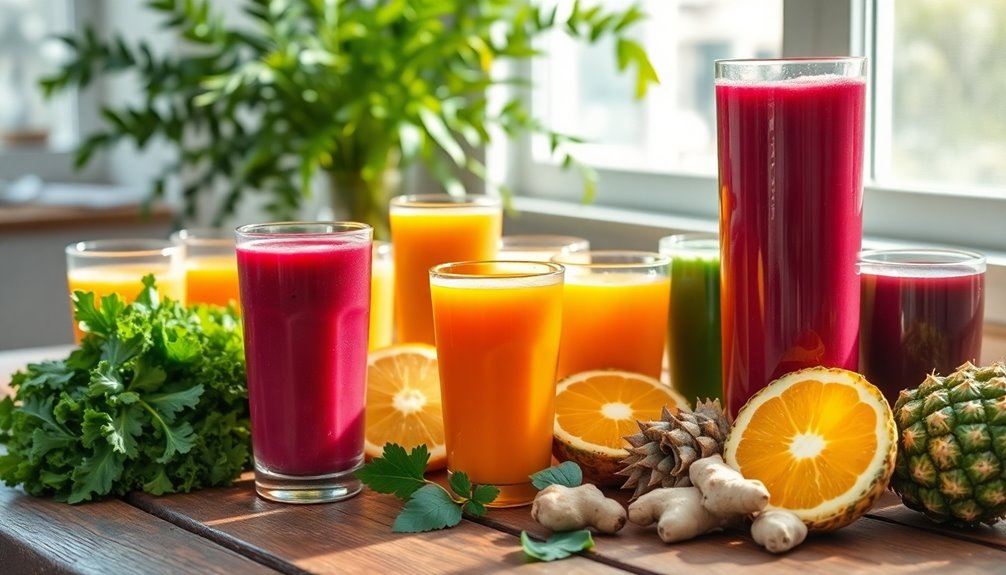
Juice cleansing often attracts those looking for a quick fix to drop pounds fast, as it typically creates a calorie deficit that leads to rapid weight loss. However, much of this initial weight loss is just water weight, which you'll likely regain once you return to solid foods. While a juice cleanse can lead to short-term results, it may also slow down your metabolism, making it harder to maintain your weight loss later. Additionally, you risk losing muscle mass, which can further hinder your metabolism. A juice cleanse can enhance your metabolism if done correctly, but it is crucial to balance it with other dietary practices. If you want sustainable weight loss, consider a balanced diet and regular exercise instead. Natural sugars in fruits can help produce melatonin, which may also improve your overall sleep quality, supporting your weight loss efforts. These approaches can help you achieve lasting results without the potential pitfalls of juice cleansing.
The Myth of Detoxification: What Science Really Says
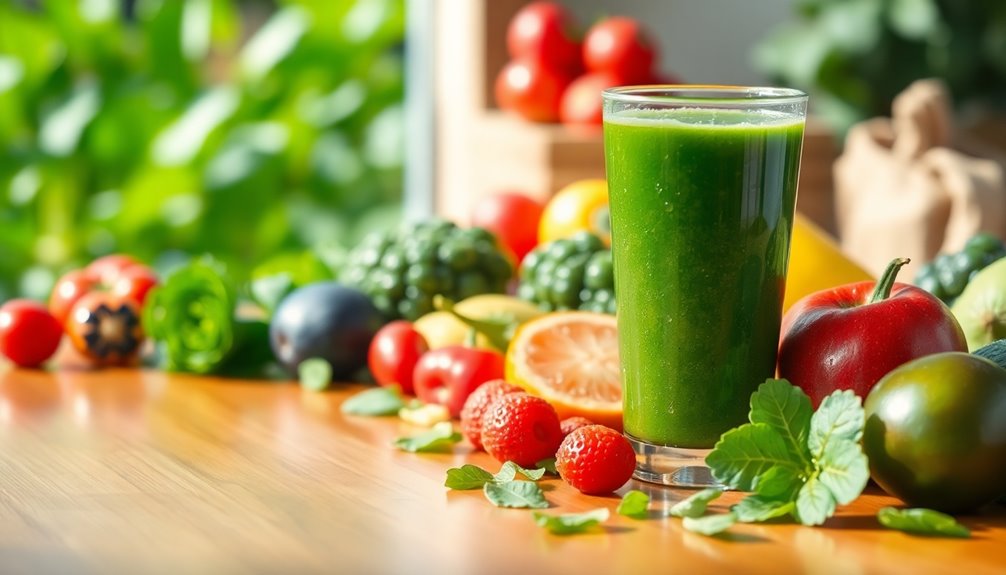
Many people turn to juice cleansing with the belief that it will detoxify their bodies and promote better health. However, science shows there's insufficient evidence to support these claims. Your body has natural detoxification processes through the liver and kidneys that don't require external methods. Many juice cleanses make misleading claims about their detoxifying effects while lacking essential nutrients. While you might enjoy the vitamins and antioxidants from juices, the low calorie count can lead to nutrient deficiencies and blood sugar spikes. Additionally, insufficient nutrient intake during juice cleanses can exacerbate health issues. Instead of juice cleanses, focus on a balanced diet rich in whole foods that support your body's natural detox processes, as well as employing high vibrational energy techniques to enhance overall wellness.
Gut Health: Can Juice Cleanses Improve Digestion?
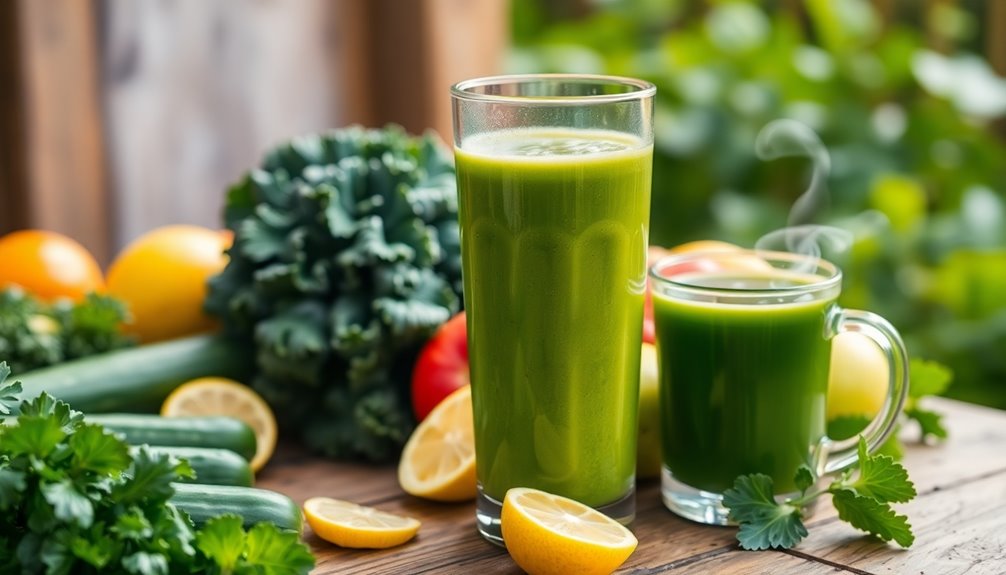
How can juice cleanses impact your digestion? Juice cleanses can significantly enhance your gut health. By providing prebiotics and probiotics, they support a healthy gut microbiome. Additionally, juices rich in anti-inflammatory ingredients can further help reduce bloating.
Eliminating solid foods allows your digestive system to rest, which can improve overall digestive health. Raw juices are packed with plant enzymes that replenish depleted enzymes in your gut, aiding digestion. Additionally, juice cleanses allow the body to focus on nutrient utilization and cell repair, expediting detoxification and addressing signs of toxicity like weight gain and fatigue.
Increased hydration from juices can soften stool and promote regular bowel movements, while the anti-inflammatory ingredients help reduce bloating.
Additionally, the high nutrient content of juices fosters a balanced gut flora, essential for digestion and immunity.
Risks of Juice Cleansing: What to Watch Out For
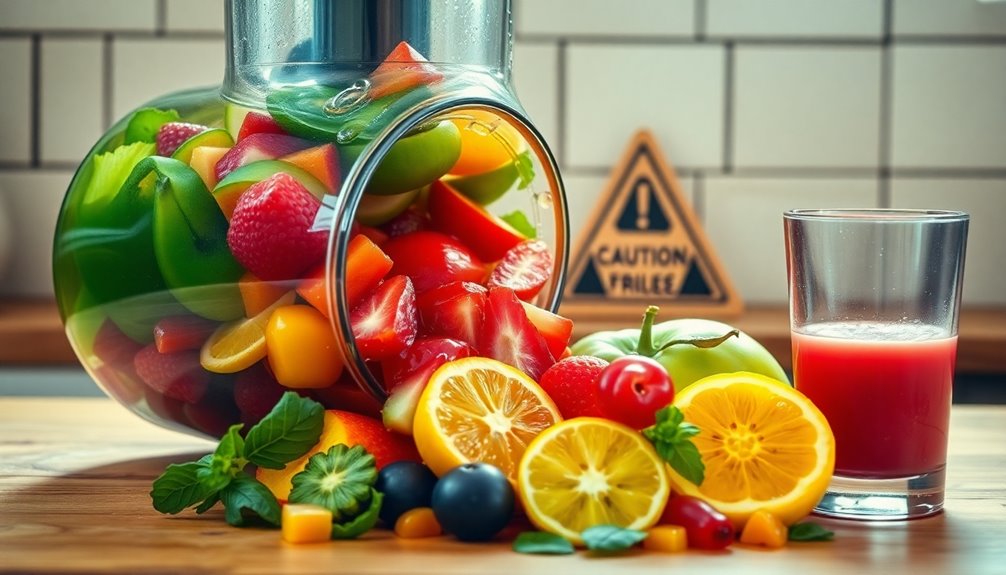
While juice cleanses can offer digestive benefits, they also come with significant risks that shouldn't be overlooked. You might experience nutritional deficiencies, as these cleanses often lack essential proteins and fats vital for your health. A low-calorie intake can lead to fainting, weakness, and dehydration. There's also the potential for vitamin and mineral imbalances, which could result in malnutrition over time. If you have diabetes, be cautious; juice cleanses can destabilize your blood sugar levels. Additionally, high-oxalate juices can strain your kidneys, and unpasteurized options pose infection risks. High levels of antioxidants in certain juices may also impact kidney stone prevention, making it essential to consult a healthcare provider. It's crucial to seek medical supervision before starting a cleanse, especially if you have pre-existing health conditions or are pregnant or breastfeeding. Always prioritize your health and safety. Moreover, the average daily caloric intake during a cleanse is about 1,300 calories, which may contribute to fatigue and dizziness.
The Role of Fiber: Why Juices Fall Short
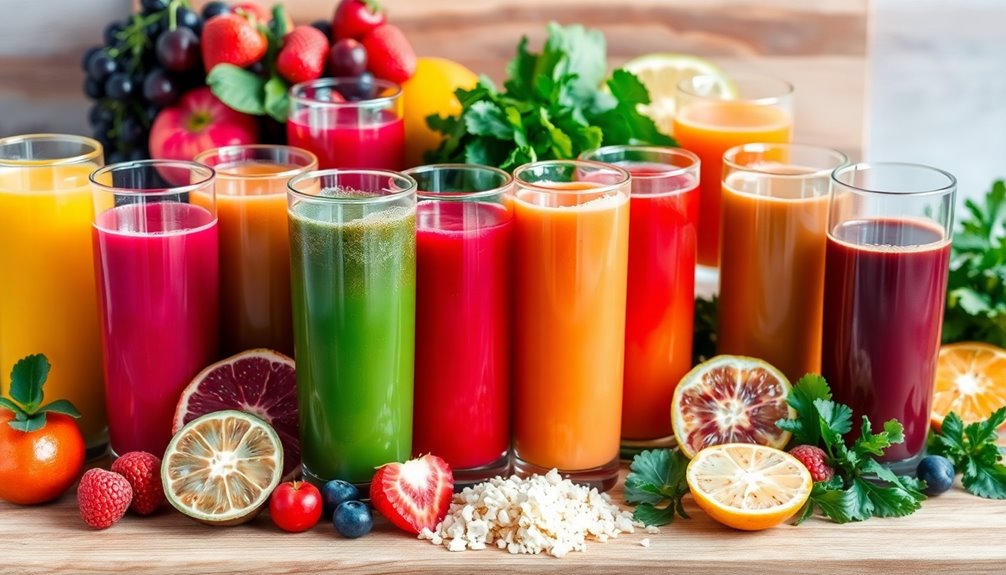
Juice cleanses might seem appealing for a quick detox, but they fall short in one critical area: fiber. Without sufficient fiber, you miss out on key digestive health benefits, like regular bowel movements and reduced constipation. Additionally, dietary fiber helps maintain healthy stool consistency and regularity, further supporting digestive health. Studies suggest that antioxidants found in whole fruits and vegetables can also combat oxidative stress, enhancing overall health.
Juices lack the essential nutrients that fiber-rich whole fruits and vegetables provide, which support gut health and promote beneficial bacteria growth. This absence can lead to digestive discomfort and even nutrient deficiencies. Plus, without the filling nature of fiber, you might find yourself overconsuming, undermining weight management goals. Ultimately, relying solely on juices can hinder your health rather than enhance it, making it clear that fiber plays a vital role in maintaining a balanced diet and overall well-being.
Sustainable Weight Management: Alternatives to Juice Cleanses
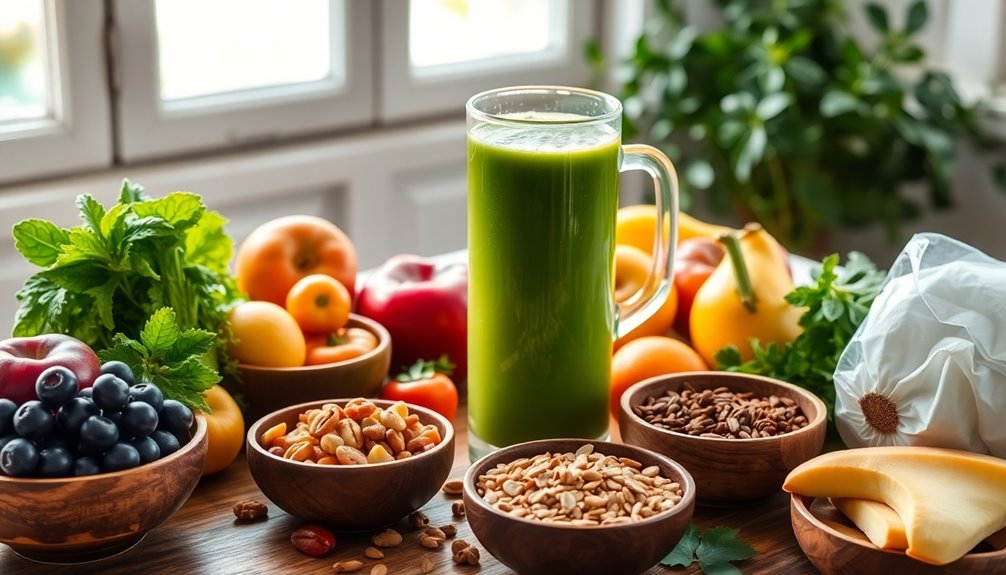
Relying solely on juice cleanses can leave you feeling deprived and unsatisfied, making it difficult to achieve and maintain weight loss goals.
Instead, focus on a balanced diet rich in nutrient-dense foods. This helps you reduce calorie intake while ensuring you get essential nutrients. A balanced diet involves reducing calorie intake with nutrient-dense foods, which can also improve your overall credit score by promoting healthier lifestyle choices.
Portion control is crucial, so be mindful of serving sizes. Meal planning can simplify your journey, ensuring consistent calorie intake and balanced nutrition.
Incorporate regular physical activity, blending aerobic exercises with strength training to boost metabolism and maintain muscle mass.
Lastly, build a supportive network to stay motivated and accountable.
Hydration and Health: The Impact of Increased Fluid Intake
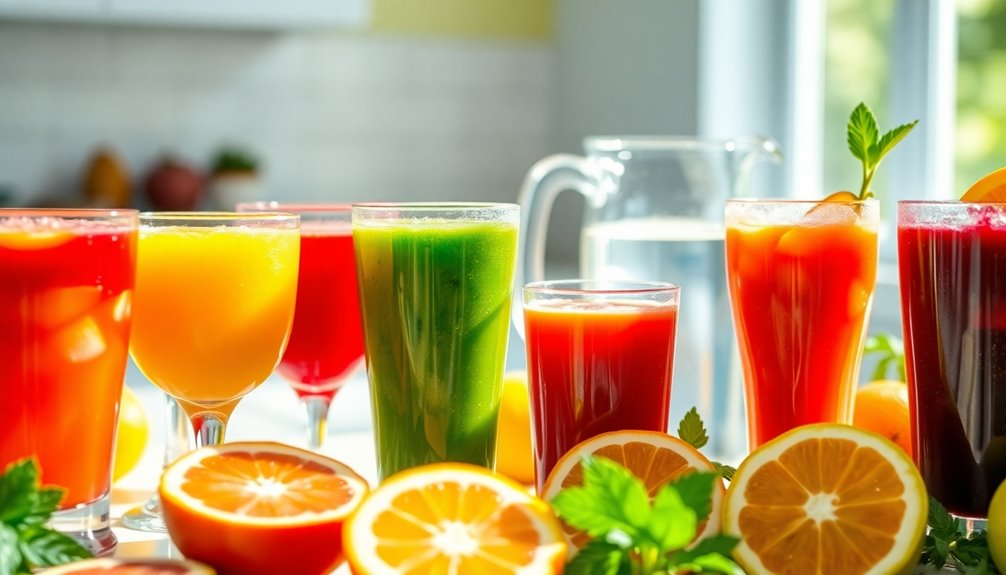
When it comes to maintaining optimal health, staying hydrated plays a crucial role in your overall well-being. Your body constantly loses fluids through sweating, breathing, and urination, so you need to replenish them regularly. Aim for about eight glasses of fluids daily, adjusting for your activity level and climate. Proper hydration supports organ function, regulates temperature, and can even reduce the risk of chronic diseases like heart failure and diabetes. Additionally, hydration is essential for maintaining muscle movement, which helps improve physical performance and reduces fatigue during activities. Drinking fresh juices can significantly enhance your fluid intake while providing essential vitamins and minerals. It's also vital for cognitive performance; even mild dehydration can impair your memory and concentration. Plus, staying hydrated helps maintain energy levels, muscle function, and joint health.
Nutrient Deficiencies: Understanding the Potential Consequences
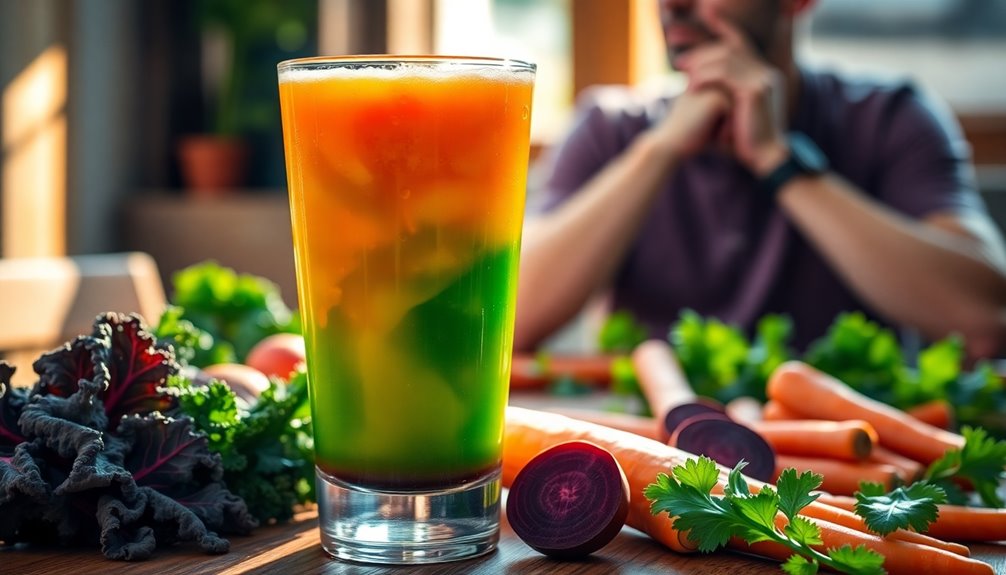
Although many people focus on macronutrients like proteins, fats, and carbohydrates, overlooking micronutrients can lead to significant health issues.
Iron deficiency, for instance, can cause anemia, making you feel fatigued and weak. Vitamin A deficiency increases the risk of preventable blindness in children and heightens infection susceptibility.
Iodine deficiency during pregnancy might lead to brain damage in infants, while a lack of vitamin B12 can impair your cognitive function. Folate deficiency poses risks like anemia and neural tube defects in newborns. Additionally, common deficiencies such as iron and vitamin A are particularly concerning in low- and middle-income countries.
These deficiencies not only affect your physical health but can also weaken your immune system, increase disease susceptibility, and hinder overall productivity.
Ensuring a balanced intake of micronutrients is crucial for maintaining your long-term health and well-being.
Balancing Your Diet: Whole Foods vs. Juice Cleansing
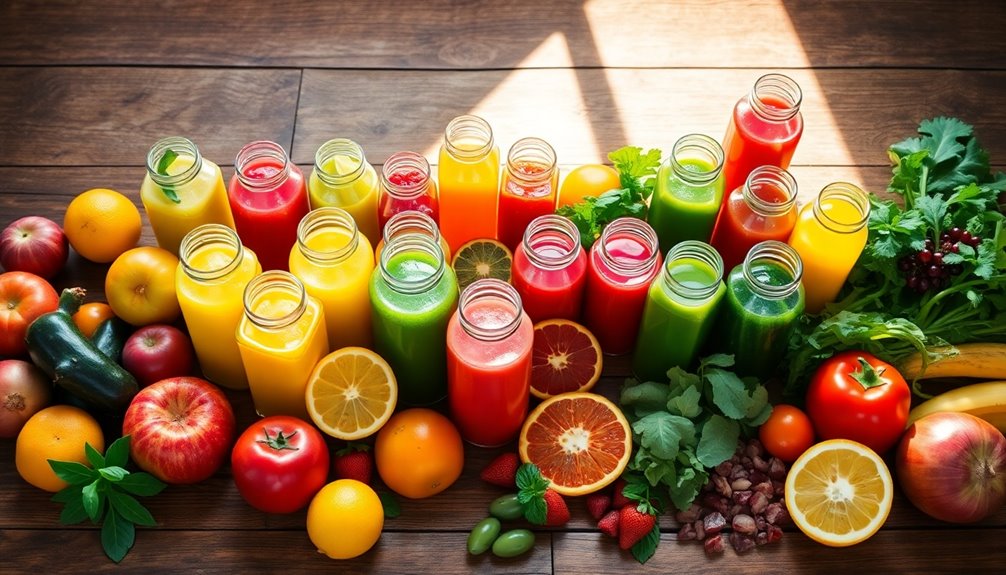
Micronutrient deficiencies can significantly impact your health, making it vital to consider how you balance your diet.
Whole foods provide essential fiber, vitamins, minerals, and antioxidants, promoting digestive health and keeping you fuller longer. They also help control blood sugar levels, slowing absorption and preventing spikes. Additionally, tropical fruits can be an excellent source of vitamins when included in your diet. On the other hand, juice cleansing offers a quick boost of nutrients but lacks fiber, which can lead to rapid blood sugar spikes and short-lived weight loss. While juices can complement your diet, they shouldn't replace whole foods entirely. Additionally, juice cleanses may increase healthy gut bacteria, contributing to better digestion and potentially aiding in weight loss. Moderation is key, and integrating blended options can help retain fiber. Always prioritize whole foods for a sustainable, balanced approach to nutrition that supports your overall health.
Frequently Asked Questions
How Often Should One Do a Juice Cleanse for Benefits?
To reap the benefits of a juice cleanse, you should aim for a 3-5 day cleanse once or twice a month.
This frequency helps with weight loss, detoxification, and mental clarity. You can replace one meal with juice daily to support gut health as well.
Just be sure to consult a healthcare professional before starting, and remember to maintain a balanced diet during your non-fasting periods for lasting results.
Can Juice Cleanses Improve Skin Health or Appearance?
Did you know that a study found people who consume more fruits and vegetables can have up to 35% healthier skin?
Juice cleanses can indeed improve your skin health and appearance. They help remove toxins, boost hydration, and provide essential vitamins and minerals.
With regular intake, you may notice a clearer complexion, reduced inflammation, and improved skin elasticity.
Just remember to balance your nutrients and stay hydrated during the cleanse for the best results!
Are There Specific Juices That Are More Beneficial Than Others?
Absolutely, some juices pack more benefits than others.
For instance, green juice made with spinach and cucumber is great for detoxification, while beet juice boosts blood flow and lowers blood pressure.
If you're looking to enhance your immune system, carrot apple juice is a fantastic choice.
Incorporating ginger can help with inflammation and digestion too.
Can Juice Cleansing Lead to Cravings for Solid Foods?
So, you think sipping on juice will magically erase your cravings for pizza? Not quite!
Juice cleansing can definitely lead to cravings for solid foods, especially if you're used to munching throughout the day. Without the crunch of actual food, those cravings might hit hard.
But hey, staying hydrated and keeping busy helps! Plus, the nutrients in your juices might just convince your body to chill out on the junk food cravings eventually.
Is It Safe to Combine Juice Cleansing With Other Diets?
It's essential to approach combining juice cleansing with other diets cautiously.
While it can enhance nutrient intake and help maintain caloric balance, you must ensure you're not missing out on protein and fiber.
Consulting a healthcare provider is crucial, especially if you have chronic conditions.
Conclusion
In the grand tapestry of health, juice cleansing can be a vibrant thread, weaving in benefits like hydration and a burst of vitamins. However, don’t let the allure of quick fixes blind you to the bigger picture of balanced nutrition. Embrace whole foods as your steady compass, guiding you toward sustainable wellness. So, before diving headfirst into a juice cleanse, remember: the path to health is best traveled with a varied plate, not just a glass. Incorporating a wide range of nutrients is essential for overall well-being, and while some may seek out the best juice brands for cleansing, it’s crucial to combine these juices with other food sources to ensure a well-rounded diet. Consider incorporating whole fruits, vegetables, and proteins that provide the energy and fiber your body needs. Ultimately, juice cleansing can complement a healthy lifestyle, but it should not replace the diverse array of foods that nourish our bodies fully.
Susannah expertise lies in researching and compiling evidence-based content on juicing, nutrition, and overall health. She is committed to ensuring that The Juicery World offers accurate, up-to-date, and trustworthy information to empower readers to take control of their health. Susannah’s goal is to inspire individuals to embrace juicing as a way to nourish their bodies and live their best lives.

